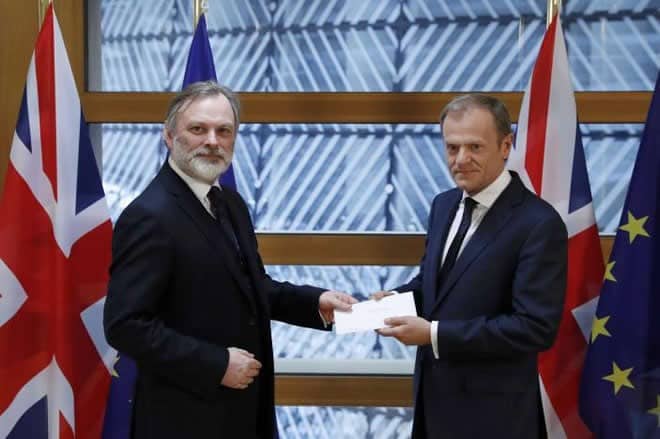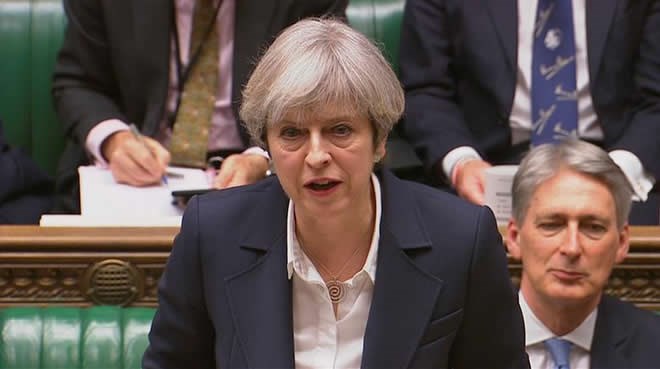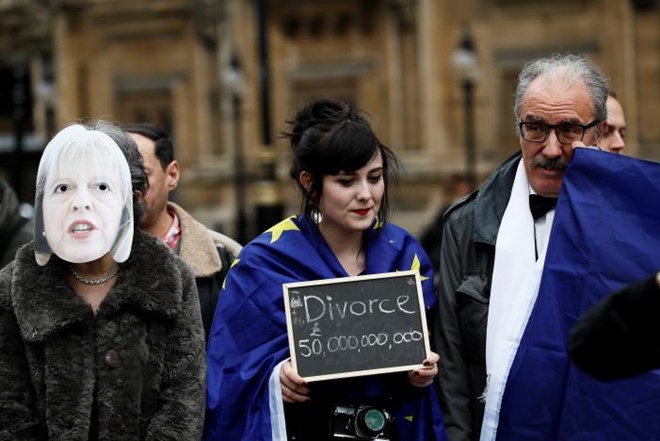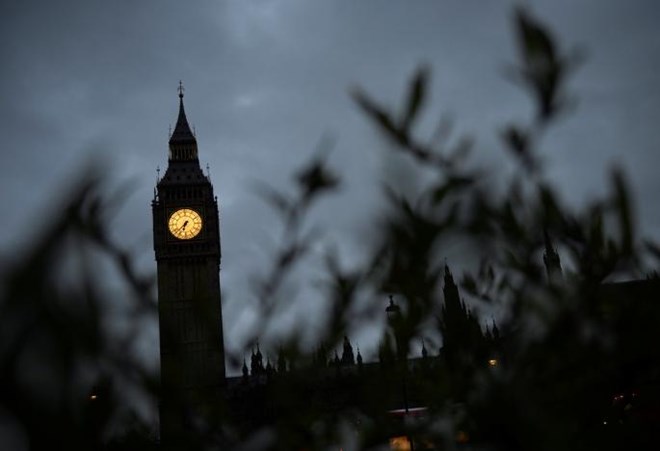Prime Minister Theresa May formally began Britain’s divorce from the European Union on Wednesday, declaring there was no turning back and ushering in a tortuous exit process that will test the bloc’s cohesion and pitch her country into the unknown.

In one of the most significant steps by a British leader since World War Two, May notified EU Council President Donald Tusk in a hand-delivered letter that Britain would quit the club it joined in 1973.
“The United Kingdom is leaving the European Union,” May told parliament nine months after Britain shocked investors and world leaders by unexpectedly voting to quit the bloc. “This is an historic moment from which there can be no turning back.”
The prime minister, an initial opponent of Brexit who won the top job in the political turmoil that followed the referendum vote, now has two years to negotiate the terms of the divorce before it comes into effect in late March 2019.
newsinisdeMay, 60, has one of the toughest jobs of any recent British prime minister: holding Britain together in the face of renewed Scottish independence demands, while conducting arduous talks with 27 other EU states on finance, trade, security and other complex issues.
The outcome of the negotiations will shape the future of Britain’s $2.6 trillion economy, the world’s fifth biggest, and determine whether London can keep its place as one of the top two global financial centers.
For the EU, already reeling from successive crises over debt and refugees, the loss of Britain is the biggest blow yet to 60 years of efforts to forge European unity in the wake of two world wars.
Its leaders say they do not want to punish Britain. But with nationalist, anti-EU parties on the rise across Europe, they cannot afford to give London generous terms that might encourage other member states to break away.

Britain’s Prime Minister Theresa May speaks in Parliament as she announces that she has sent the letter to trigger the process of leaving the European Union in London, March 29, 2017. Parliament TV handout via REUTERS
BREXIT DEAL?
May’s notice of the UK’s intention to leave the bloc under Article 50 of the EU’s Lisbon Treaty was hand-delivered to Tusk in Brussels by Tim Barrow, Britain’s permanent representative to the EU, on the top floor of the new Europa Building in Brussels, according to a Reuters photographer in the room.
That moment formally set the clock ticking on Britain’s two-year exit process. Sterling, which has lost 25 cents against the dollar since the June 23 referendum, jumped to $1.25.
May signed the 6-page Brexit letter on Tuesday night, pictured alone at the cabinet table beneath a clock, a British flag and an oil-painting of Britain’s first prime minister, Robert Walpole.
Her letter sought to set a positive tone for the talks though it admitted that the task of extracting the UK from the EU was momentous and that reaching comprehensive agreements within two years would be a challenge.
May wants to negotiate Britain’s divorce and the future trading relationship with the EU within the two-year period, though EU officials say that will be hard given the depth of the relationship.
“We believe it is necessary to agree the terms of our future partnership alongside those of our withdrawal from the EU,” May told Tusk in her letter, adding that London wanted an ambitious free trade agreement with the EU.
“If, however, we leave the European Union without an agreement the default position is that we would have to trade on World Trade Organization terms,” she said.

Protesters gather outside Parliament after Britain’s Prime Minister Theresa May triggered the process by which the United Kingdom will leave the European Union in London, March 28, 2017. REUTERS/Stefan Wermuth
TRADE AND SECURITY
May has promised to seek the greatest possible access to European markets but said Britain was not seeking membership of the ‘single market’ of 500 million people as she understood there could be no “cherry picking” of a free trade area based on unfettered movement of goods, services, capital and people.
Britain will aim to establish its own free trade deals with countries beyond Europe, and impose limits on immigration from the continent, May has said.
In an attempt to start Brexit talks on a conciliatory note, May said she wanted a special partnership with the EU though she laced that ambition with an a clear linkage of the economic and security relationship.
EU leaders will welcome assurances of a constructive approach and appreciate a commitment to remain a close partner for the EU and to encourage its development, as well as an explicit recognition that Britain cannot retain the best bits of membership after leaving.
They may be less warm to an implication that Britain could live with a breakdown of talks on trade coupled with what might be seen as a threat to disrupt the security and counter-terrorism cooperation for which Britain, as a member of the U.S.-backed Anglophone Five Eyes system, is highly valued.
“We should work together to minimize disruption and give as much certainty as possible,” May said. “Weakening our cooperation for the prosperity and protection of our citizens would be a costly mistake.”
Tusk said the EU would seek to minimize the cost of Brexit to EU citizens and businesses and that Brussels wanted an orderly withdrawal for Britain.
“We already miss you,” said Tusk who will send the 27 other states draft negotiating guidelines within 48 hours. “Thank you and goodbye.”
Germany will strive in Brexit negotiations to make sure there is as little disruption as possible to the lives of European Union citizens living in Britain, Chancellor Angela Merkel said.
Stressing that she hoped Britain and the EU would remain close partners, Merkel said the prospect of Brexit made many people in Europe worried about their own personal future.
“This is the case especially for the many Germans and European citizens in Britain. Therefore, the German government will work intensively to make sure the effect on the everyday lives of those people is as small as possible,” she said.

The Big Ben clock tower is seen in London, Britain March 29, 2017. REUTERS/Hannah McKay
TWO YEAR BREXIT
But the course of the Brexit talks – and even their scope – is uncertain.
“The time-frame is damn narrow,” said Martin Schaefer, a spokesman for the German Foreign Ministry.
In recent months, German officials have made clear that they do not believe there is time to negotiate a bespoke transitional agreement for Britain that would come into force immediately after Brexit.
A huge number of questions remain, including whether exporters will keep tariff-free access to the single market and whether British-based banks will still be able to serve continental clients, not to mention immigration and the future rights of EU citizens in the UK and Britons living in Europe.
One major uncertainty for May is who will be leading France and Germany, which both face elections this year.
“It’s bad news for everybody. It’s a wedge pushed into the European project,” said French centrist presidential candidate Emmanuel Macron, who has made clear he would ensure Britain gains no undue advantages outside the Union.
UNITED KINGDOM?
At home, a divided Britain faces strains that could lead to its break-up. In the Brexit referendum, England and Wales voted to leave the EU but Scotland and Northern Ireland voted to stay.
Scottish nationalists have demanded an independence referendum that May has refused. In Northern Ireland, rival parties are embroiled in a major political crisis and Sinn Fein nationalists are demanding a vote on leaving the UK and uniting with the Republic of Ireland.
May said she knew that triggering Brexit would be a day of celebration for some and disappointment for others.
“Now that the decision to leave has been made and the process is under way, it is time to come together,” she said.